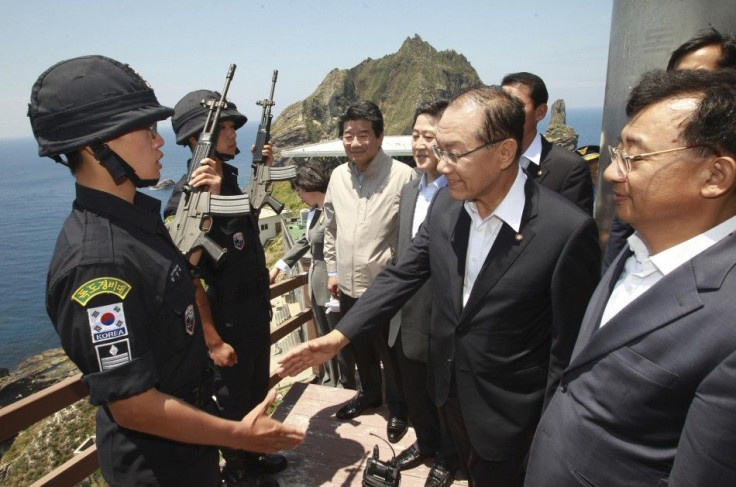South Korea And Japan Set To Sign Historic Defense Agreement

Wounds from history heal slowly in Asia. Yet, despite pervasive resentment against Japan's control over their country in the early 20th century, South Korea now looks ready to move forward to establishing closer security relations with its eastern neighbor.
The South Korean government gave the nation a shock on Wednesday. It announced the approval of a landmark decision to sign a new military agreement with Japan.
The General Security Military Information Agreement (GSOMIA) would allow the two counties to pass classified military intelligence to one another directly, improving cooperation and consensus amid Northeast Asian security crises.
Japanese Chief Cabinet Secretary Osamu Fujimura confirmed on Wednesday that negotiations between the two countries would soon be concluded. By Friday, South Korea's Ambassador to Japan, Shin Kak-soo, could be sitting down with Japanese Foreign Minister Koichiro Gemba to put the pen to the new pact.
South Korean news agency Yonhap reported that the Korean Cabinet finalized the decision on Tuesday.
The GSOMIA has long been pushed by Japan and South Korea's mutual ally, the U.S., to improve military contacts and intelligence transfers between Seoul and Tokyo. Previously, the U.S. had served as something of a middleman for intelligence that moved between the two countries.
Incentives for the new agreement are largely seen to have come from diminishing tolerance in both countries for North Korean provocations and rising concerns over China's military growth.
The North Korean government followed the announcement by making a statement saying the government of South Korean President Lee Myung-bak was selling the nation out.
That was a sentiment which many South Koreans themselves echoed. Members from 48 civil society groups gathered to protest the decision outside of government offices. The short span between the approval and public disclosure has led opposition politicians and activist groups to harshly criticize the government.
Japan and South Korea remain embroiled over divergent interpretations of their recent past. Koreans remain deeply emotional over the annexation of the Korean Peninsula by the former Japanese Empire, from 1910 to 1945. Coupled with ongoing territorial disputes between the two over the Dokdo Islands (which South Korea administers, but Japan calls Takeshima and says belong to its Shimane Prefecture), historical memories and national narratives of past Japanese oppression leave many Koreans wary of a close diplomatic relationship.
No surprise then, that some called the new agreement an implicit absolution of war crimes committed by Japan during WWII, including forced sexual slavery of comfort women by Japanese army officers then stationed in Korea.
The Korean Council for Women Drafted for Military Sexual Slavery by Japan, an activist group which seeks to publicize wartime abuses of women, issued a response to the government saying that it had insulted the victims of sexual slavery.
The leader of the opposition Democratic United Party told Korean news angencies that the Cabinet had broken an earlier promise to consult the National Assembly (legislature) before making their decision.
In 2006, after learning that Japan prepared to send oceanographic vessels to survey the area around the Dokdo islands, the government of then president Roh Moo-hyun announced that it would send 20 armed ships to the area to stop any trespassing Japanese vessels. That spat was only six years ago -- and that indicates how effective pressure from a changing balance of power in East Asia has forced both governments to begin working past their differences.
Nevertheless, President Lee's New Frontier Party will now face closer scrutiny over the issue of the Acquisition and Cross-Servicing Agreement (ACSA). That agreement could further strengthen Korean-Japanese defense relations by allowing for exchanges of military equipment (except combat arms and weapons). The ACSA could allow Japanese troops to enter South Korean territory (with invitation), something that hasn't taken place since the end of WWII.
A formal alliance between the two countries remains largely wishful thinking. Nevertheless, American policy makers increasingly see a trilateral relationship as the key to securing Northeast Asia as the U.S. executes its pivot to an Asia-centric strategy.
We welcome closer ties between our allies, Japan and the Republic of Korea, said the U.S. State Department on Wednesday.
© Copyright IBTimes 2024. All rights reserved.





















